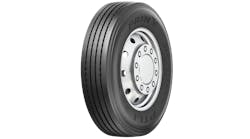More Details on NTW Joint Venture From Scott Clark and Erik Olsen
The wholesale landscape will look a lot different when TBC Corp. becomes a joint venture company owned by Michelin North America Inc. and Sumitomo Corporation of Americas (SCOA).
Scott Clark was in just the third day of his new job as chairman and president of Michelin North America when the deal that will create the second largest wholesale tire distributor in the U.S.A. was announced on January 3.
Michelin is paying $630 million to become a 50-50 joint owner with SCOA in TBC. The transaction is expected to close by March 2018.
Two businesses will be combined under the joint venture: Michelin’s Tire Centers LLC (TCi) distribution business and TBC’s Carroll Tire Co. The new entity will be called National Tire Wholesale, or NTW. TCi President and COO Don Byrd will lead the new NTW wholesale business as president and COO. (TBC’s other operating companies and executive team members will not change.)
TCi is the fourth largest tire distributor. Carroll is the fifth largest. Combining those entities will push the new distribution business to No. 2 in terms of market share. “That’s the big news and the big change in terms of increased service capability,” Clark told Modern Tire Dealer.
What can dealers expect from the joint-venture company? MTD turned to Clark and Erik Olsen, CEO and president of TBC Corp., for answers. Olsen will continue in that role when the deal is complete.
MTD: What does being the No. 2 distributor mean to Michelin?
Clark: Number two simply means that we’ll have a broader network, more points of distribution and to be able to provide better service to our customers. For us, it’s about increasing our service capabilities and increasing our scale so that we can be a better supplier to both independent dealers and to provide secondary supply to our direct customers.
One of the challenges that dealers face today is increasing category complexity, increased size of tires, increased working capital constraints. They need more frequent delivery options, they need a broader geographic footprint. That’s what this new joint venture is going to provide them.
MTD: You’ve recently sold TCi stores to independent tire dealers. How did those sales lead up to this joint venture?
Clark: Actually, the divesture of the commercial network of TCi is absolutely unrelated to what we’ve done on the wholesale distribution side here. In both cases we have a strategy to better serve the end customer. We found we can better serve our fleet partners by basically divesting our TCi commercial business to key truck partners who have their own service network so we can create a broader commercial service network. So that was the strategy on the commercial truck side.
On the passenger side, our strategy has always been how we increase our geographic footprint, our presence, our scale, and our brand offering for TCi. The timing is kind of coincidental but they have been distinct strategies.
MTD: How will the joint venture affect Michelin dealers?
Clark: We have different kinds of dealers. We have direct customers and we have indirect customers. For either one, this is great news. This joint venture brings together Carroll and TCi and creates NTW, a new wholesale entity with a much larger geographic footprint, a broader and deeper array of brands and price points and products, and greater service capability. So whether you’re a Michelin dealer that’s one of our Alliance associate dealers who currently buys through TCi or buys through Carroll, now you’re able to buy from an entity that provides much greater service. If you’re a direct retailer of Michelin who gets supply through what we call Express Delivery, you’ll have better service capabilities with a network with a broader, geographic footprint.
MTD: What does this joint venture mean to retailers in TBC’s network?
Clark: If you’re a Big O Tires franchisee or NTB retail store, there’s really no change. That’s really driven by the fact that the retail strategy for NTB and Michelin’s retail strategy will remain the same. Michelin’s strategy has been and will continue to be to invest in our products, invest in our brand equity and make our brands available wherever our consumers choose to buy their products from. That means we’ll continue to be a supplier to NTB, we’ll continue to be a supplier to Big O Tires. But we’ll also continue to be a supplier to all of our very important retailer partners, so you won’t see a big change at all on the retail strategy of Michelin nor will you see it on the NTB side, they will continue to go to market as they go to market today with the same brands and the same look.
The reason we’re so excited about this joint venture is the opportunity to better serve our customers and end consumers by providing a broader network, expanded geographic footprint, a greater array of brands and products, and better service. In today’s environment, that is important as both consumer expectations and dealer expectations for service are going up.
The other thing it provides us that we’re interested in is the future of mobility and the needs of future passenger fleets. Being able to partner with a retail network like TBC gives us some things that we can test and develop for the benefit of all of our retail partners.
How NTW Advances TBC’s Objectives
Olsen answered questions specific to TBC’s business. The company’s retail network includes more than 2,400 locations in North America: 445-plus Big O Tires franchise outlets; 730-plus company-owned retail stores under the Tire Kingdom, NTB Tire & Service Centers, and Merchant’s Tire & Auto Centers brands; and 1,225-plus Midas franchise locations. The company’s TBC Brands LLC subsidiary offers 15 proprietary brands for passenger, commercial, farm and specialty tires.
MTD: What does the joint venture mean for TBC’s retail side in the short and long term?
Olsen: In terms of retail and franchise, there’s absolutely zero change in TBC’s short- or long-term strategy with those business groups. We’ve got a robust growth plan in place and TBC Corp. will continue to execute on those strategies.
As it relates to proximity wholesaling, which would be the Carroll Tire-TCi merged entity called NTW, the joint venture really helps TBC achieve our long-term objective with Carroll Tire, which was to have a national footprint to better serve our existing and new customers, consumers and franchisees. The joint venture accelerates that growth. It’s an exciting time for us here at TBC as we now have a national footprint with our wholesale distribution arm.
As it relates to TBC Brands, we have a whole portfolio of passenger, light truck, medium radial truck, agriculture, commercial, specialty tires and brands and that gives us the opportunity to satisfy a large constituency of customers. We’ll continue to do that. In fact, TCi was already a TBC Brands customer, so the transition to TBC Brands for NTW will be that much easier when Carroll Tire and both TCi both carry some of the TBC-branded product.
MTD: How does the joint venture position TBC for growth?
Olsen: The story here is really about NTW. As it relates to TBC, it just focuses on our ability to better serve our existing and new customers with TBC-branded product and also to provide a higher level of service to our existing and new franchisees.
MTD: What new products and services can tire dealers expect?
Olsen: The new NTW, along with the balance of the TBC portfolio of retail franchise and tire brands, enables us to be full-service provider to fleets across the United States. As you look at different mobility options in the future, be it autonomous or however that space is going to evolve, having the diverse portfolio of service providers that we have under the TBC umbrella gives us the opportunity to really give a high level of service to all fleets, car dealers and emerging mobility channels in the United States.
For more information, read MTD’s initial story on the joint venture here.



